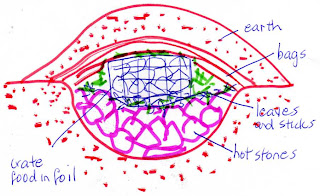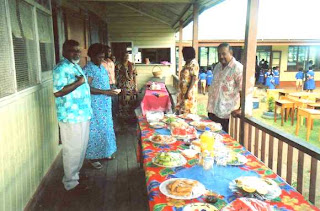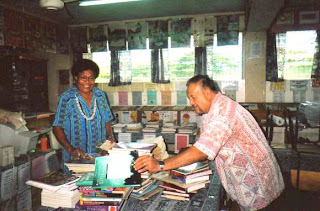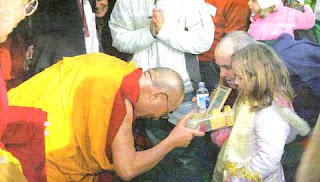from w
I found this interesting take on a trip to Vanua Levu - it's part of a writer's travel diary - mainly a list of observations - it goes onto a trip around Lau later on. I left out his/her initial descriptions of Nadi and nearby also. The whole web entry is at
fencemag and entitled Septembre.
……
Jump another carrier back to the airport and then off again, up near the cockpit bulkhead, on an old patched-up Twin-Otter for Vanua Levu, the other big island
Across the Ba River high country at eleven thousand feet
Peaks to thirteen hundred meters, cane field slopes, the single roads in toward isolated farms are the only roads out
Off the coat cross Viti Levu's encircling barrier reef and then over Bligh Water
After the mutiny, the Bounty skipper and eighteen of his crew came through here in their open boat on the way to Timor in 1789
Rightly terrified by the well-deserved reputation of being the Cannibal Isles, they were chased through Bligh Water by Fijian war canoes
Tip down over Vanua Levu's reefs and islet coral heads through scattered rain clouds and slant a tight turn to the strip at Savusavu
A narrow belt in the clouded-in rainforest green
The town is one street along the water, the stores and offices up against the slope, the market and open greens on the inlet side
The market is exotic, provincial
The boat tied up stern-to in the old copra shed marina in water clean enough for swimming
Fecund green mountains like Tahiti or Morea high across the water
Frigatebirds above the bay
Pacific swallows and a spectrum of small tropical doves
With a rented Suzuki, the road to Labasa in the morning
Ravaged by a cyclone in January 2003
The sugar side of Vanua Levu
And locale of the short-lived sandalwood trade
Joss sticks burn on shelves beside cane knives and gauntleted cane cutters' gloves in the only duka open in downtown Labasa on Sunday morning
A narrow, dark and deep emporium whose inventory comes from the ends of the earth
Clerked by wary young Indo-Fijian women
Skinny sullenness in their pistachio and raspberry colored saris Stares as dark as the peregrine on perch in the mountains on the way from Savusavu
Nearly black, a Falco peregrinus neiotes, the Fijian variation
Peregrine falcons are called shaheen in Hindi, have the widest natural range of any bird, 78ºN to 56ºS, and breed on every continent but Antarctica
In the Labasa region, four out of five cane-worker families are Hindu
There are mosques in the cane-field villages where the Muslims live
Ragged, even nearly derelict, sugar villages with cane sugar a glut on the world market
Fiji is half Fijian, half Indo-Fijian, nearly three out of four around Labasa are Indo-Fijian
UN statistics declare that spousal abuse and female suicides in and around Labasa is at seven times the world average
An extremely rural place, a twenty-first century My Antonia locale with Islam, bride price and purdah piled on
All over Fiji, kinetic Pacific swallows, spotted doves, shy ground-doves, Layard's white-eyes, silvereyes
The white-eyes and silvereyes like sunny motes
The absolute antithesis of the peregrine in the mountain clouds, that dark, careful, imposing falcon, flying slowly off its perch
Its wing beat away is like any raptor's but peregrines in their duck-hunting power dives reach stoop speeds of 250 kph or more
Leave Labasa eastward via Cobra Rock, toward the eastern end of Vanua Levu
Fiji is cobraless except in the bright imaginations of Indo-Fijians
Out on the empty Nubu-Vitina Road past the point of no return of being able to get back to Savusavu before dark on partial pavement
Sense of the complex immensity of the world vivid as the afternoon itself
Deep into the unpopulated backcountry of one South Pacific island of which there are tens of thousands
But manifestation of the world's abiding stability in a serene and motionless sacred kingfisher, Halcyon sancta, vivid blue and gold on a ragged lightning-struck stub of a big Fijian kauri tree off the treacherous road
Eternity could be following out bad roads in far corners of the world like this one, and that wouldn't be a bad eternity at all
Comfortable like the lowering of the halcyon afternoon
Down the long, long Bay Road past downslope coastal villages, a Christian revival meeting in one, talk with the ministers there, each wearing a sulu and sandals, with jackets, shirts and ties
Curious, extremely polite, intelligent and sane
Religion in extremely isolated places like backcountry Fiji perhaps the only path to any offshore universals
The missionaries always were the first to arrive, and then with progression to zenophobic nationalism, Christianity is the last to succumb
Off with the boat to Taveuni next morning, a light half day's sail
......
etc.



































